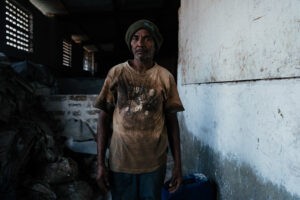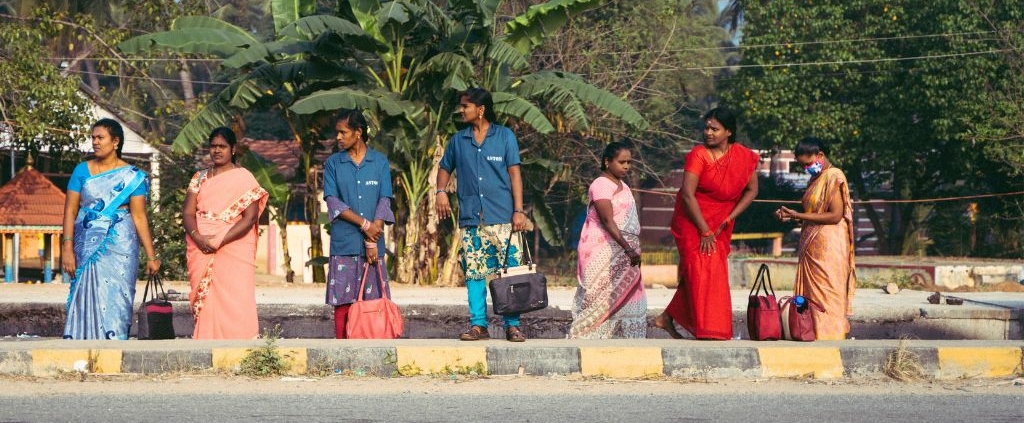A decade of strides: worker voices resonate In Ambur
Cividep completes 10 years in South India’s leather manufacturing hub to bring together low-wage workers & create awareness about their rights
Soniya, a native of Melpatti village near Ambur, was 16 years old when she became a leather homeworker, stitching shoe uppers for middlemen from the local factories. Back then, she would dream about leaving her home to land a fancy factory job like many from her village, who seemed happy to take the company bus to work and get Provident Fund and health insurance.
However, her perspective has undergone a dramatic change with some awareness of basic employment relations. “A factory worker who makes a small mistake is reprimanded harshly by people above her,” says Soniya, who for the last decade has been documenting the challenging working conditions in Ambur, South India’s leather manufacturing hub. Shopfloors continue to focus on meeting high production targets often at the cost of workers’ health, she says.
But there are signs of improvement with workers being more aware of their employment conditions. This is partly due to the consistent work by Cividep’s team, which started its awareness programme among the leather sector workers 10 years ago. Today, Cividep’s Worker Resource Center (WRC), situated on Pillayar Kovil Street, serves as a vital platform for the region’s diverse workforce, a place where home-based workers, factory employees, and tannery workers, come together and learn about labour laws and what they are entitled to.

Reaching out to leather sector workers
A core focus of Cividep’s work since its inception in 2000 has been to educate about decent work among workers at the bottom rungs of global supply chains, whether it is garment, electronics, plantation or leather. “Given that our focus has been on vulnerable workers in global supply chains, it was natural that we started engaging with workers in the leather merchandise export industry. The workers are women drawn largely from marginalised backgrounds,” says Gopinath Parakuni, Founder and Strategy Director. Home-based workers, who remain formally unrecognised as employees and tannery workers are mostly from poor and vulnerable backgrounds.
Cividep’s first engagement in the region started in 2013 with an exploratory study about women homeworkers. This was spearheaded by Gopinath and officials from Homeworkers Worldwide (HWW), a UK-based non-profit. Subsequently, a team comprising Antony Raju (consultant) and Kaliyaperumal Narayanan (Worker Training and Research Support Officer) mapped homeworkers for a project commissioned by HWW. They estimated that there were around 25,000 women workers after a survey of around 30 villages in and around Ambur, Pernambut and Vaniyambadi. “What shocked us most were the piece rates the women received for each hand-stitched pair. We assumed it would be at least Rs.100 considering that these were branded shoes that retailed at Rs. 3000-4000 per pair. But workers got only Rs. 7-17 for hand stitching a pair,” recounts Antony.
The team also had extensive interactions with shoe factory and tannery workers, village panchayat leaders, factory security staff, school teachers, and trade union leaders. Eventually, they recommended the setting up of a tuition centre (in pic), in Melpatti village, 15 km from Ambur, for the children of factory and homeworkers. The centre ensured that the children spent time on educational pursuits while their mothers were at work. It also built rapport & trust among the local workforce.
Building Trust
In 2016, Cividep set up a WRC, which initially focused on sensitising homeworkers on gender equality, health and access to social security schemes. The aim was to bring together women despite the organisation’s limited resources.
Over time, local supporters were engaged to spread the message about the WRC. The team also devised a multi-pronged strategy to build awareness among homeworkers and factory workers while liaising with local civil society organisations and collectives. As the team gained trust among people it was able to conduct more in-depth studies on working conditions. In this period, the team also focused on building the leadership of homeworkers so that they could come together to address their grievances as a collective. The team supported homeworkers form self-help groups which later transformed into a membership-based collective called Penn Thozhilalar Munnetra Sangam (PTMS). It has several women homeworkers as members and plays an active role in addressing issues faced by women.
In 2016, Cividep partnered with HWW to bring out ‘Stitching Your Shoes’ study report, which focused on global brands with homeworkers in their supply chains. The report gained attention, especially in the UK, as it had named brands associated with the multi-stakeholder initiative, Ethical Trading Initiative (ETI). The late Jane Tate, founder of HWW, approached several brands with the report, who initially engaged but later withdrew. Finally, in what is considered a major milestone, a prominent international shoe brand approached Cividep to help identify homeworkers in its supply chain.
“Though we don’t usually engage in brand-funded initiatives, we saw a chance to make a difference since homeworkers lacked leverage. We aimed to set a precedent, showing that brands can recognise, accept, and take action to support homeworkers,” recalls Pradeepan Ravi, Programme Lead, who led the initiative.
A milestone
The study confirmed the presence of homeworkers in the brand’s supply chain, and researchers had access to the supplier factory and the management’s cooperation. Yet, trust-building became crucial. “We had to consider various strategies to get the cooperation of the supplier. One was to use the brand’s leverage with the supplier strategically and the other was to develop rapport and trust with the supplier management,” says Pradeepan.
At the end of the exercise, the brand and suppliers agreed on an official Homeworkers Policy, introduced job cards to record their work, and also agreed on a 36% wage hike. For the team, the most satisfying takeaway was being able to arrive at these agreements with various stakeholders, including the intermediaries/contractors, all the while staying firm on the core principles of stakeholder dialogue.
Many homeworkers, who were unaware of their employers, were able to meet brand and supplier representatives for the first time, at a roundtable meeting organised by HWW in December 2017. The accounts by the women of the years spent toiling at meagre wages and at a great cost to their health were a revelation.
Way Forward
Early successes like these motivate the team to continue their work. HWW and Cividep have put together guidelines for brands to improve transparency about homeworking within their supply chains. Through later projects like Together for Decent Leather (2020-2023) and Finding Hidden Homeworkers, the team has brought to light the state of workers post-pandemic. Despite business recovery, there are indications that supplier factories continue to avoid worker-centric measures.
“Yet there are heartening outcomes in terms of worker awareness and solidarity,” says Kohila Senbagam, Project Coordinator, Leather Sector. Homeworkers are asking for recognition and higher pay, while factory workers seek their entitlements. This recently led to the establishment of a government dispensary in the district. Meanwhile, Cividep continues to reach out to brands and multi-stakeholder initiatives to improve transparency, human rights due diligence, and access to remedy.
Lucy Brill, former Director of HWW, looks back at the shared work history of both organisations to note that change takes time. “Changing things in the lifetime of the homeworker is difficult, and real change needs to come from brands, with whom it is very difficult to work together.”
Though change is difficult, the goal is to sustain the momentum set by the team ((in pic above), which consists of Kohila, Soniya, Gokulavasan (Field Coordinator), and Elamathi (Field Officer). The vision for the workforce remains clear. “We have brought together homeworkers and encouraged them to understand their rights and entitlements,” says Soniya.


 Cividep
Cividep